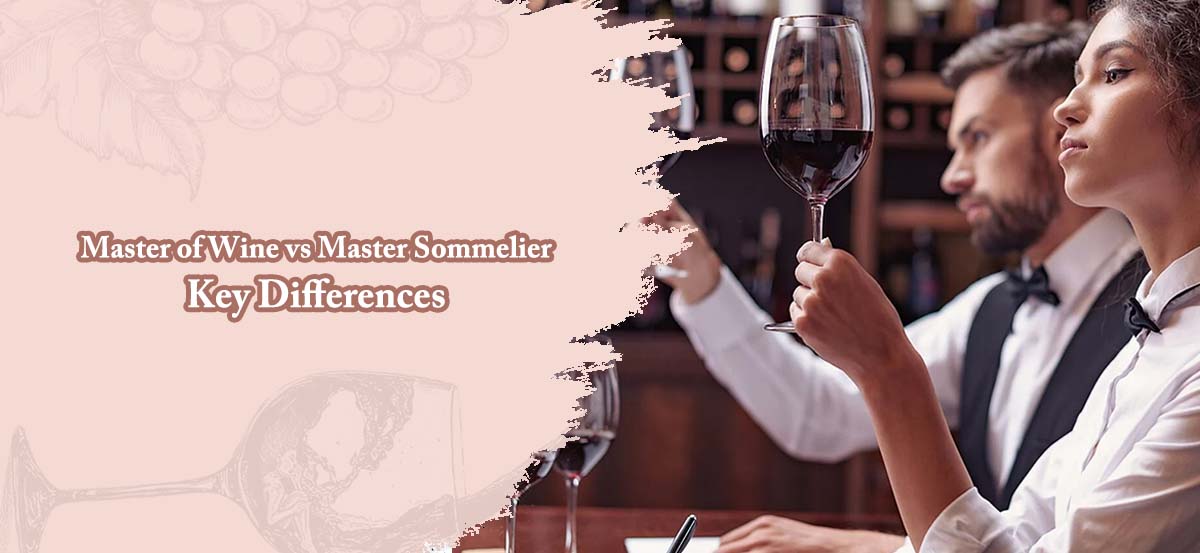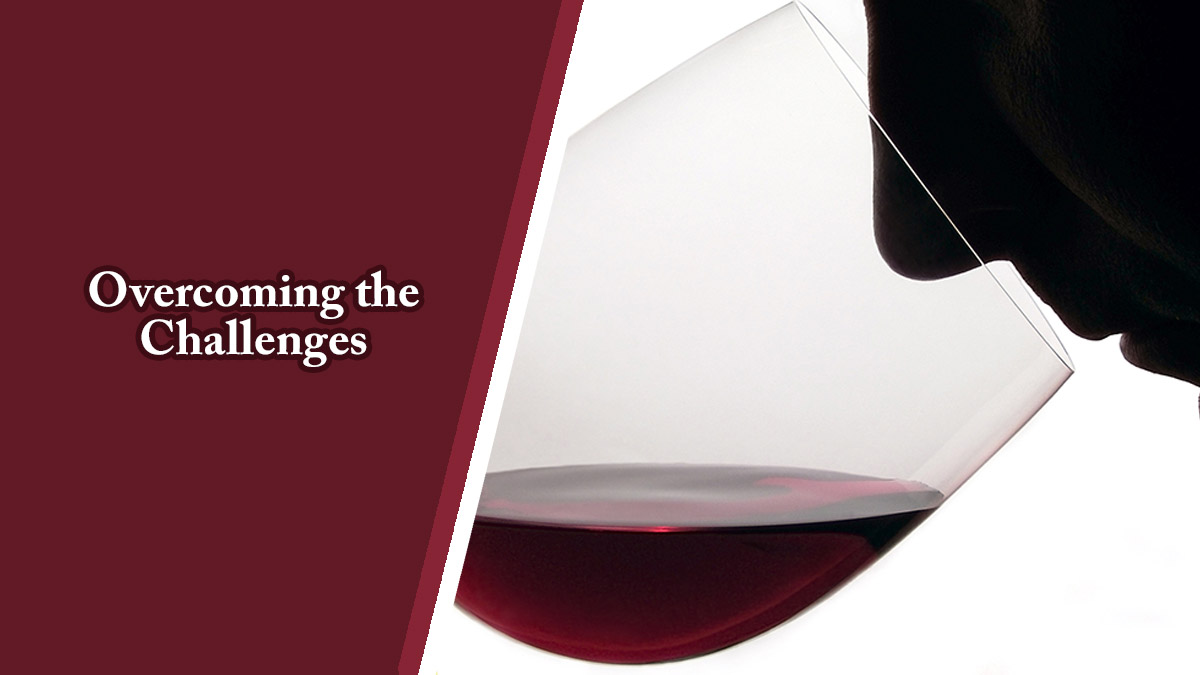Master of Wine vs Master Sommelier
If you’re looking to advance your career in the wine industry, then two of the highest credentials to work towards are becoming a Master of Wine vs Master Sommelier. These certifications signify that you have reached an elite level of expertise and knowledge about all aspects related to wines – from production and storage to different varietals and regions, down to finding what would best pair with certain dishes. While there are similarities between these distinctions, aspiring professionals need to explore both titles so they can decide which one is better suited for their career goals and interests.
In this blog post, we’ll discuss the differences between attaining a Master of Wine or Master Sommelier rank so you can make an informed decision on which one is right for you!
The Master of Wine vs Master Sommelier Programs: An Overview
To many, wine is more than just a beverage- it is a passion, a lifestyle, and a career. For those looking to elevate their understanding of wine and turn their passion into a profession, the Master of Wine (MW) and Master Sommelier (MS) programs are the ultimate goals. These programs are considered the most prestigious wine education programs in the world, and they attract serious wine enthusiasts and professionals alike. Before going into a comparison of the two terms, we’ll give you an overview of the MW and MS programs, what they entail, and what it to earn these prestigious titles.
Master of Wine Program
The Master of Wine program was founded in 1955 and is based in the United Kingdom. It is run by the Institute of Masters of Wine, which is an international organization with over 400 members from 30 countries. The MW program is a comprehensive, in-depth course that covers all aspects of wine, including viticulture, winemaking, and business. It takes an average of 3-4 years to complete the program, and only about 400 individuals worldwide hold this title.
The MW program consists of 3 stages, each with its own set of examinations. The first stage is a written examination that tests basic wine knowledge, the second stage is a tasting examination that assesses the candidate’s ability to identify grape variety, region, and vintage, and the third and final stage is a research paper and an oral examination.
Master Sommelier Program
The Master Sommelier program was founded in 1969 and is based in the United States. It is run by the Court of Master Sommeliers, which is an international organization with members from around the world. The MS program is considered the premier credential in the wine service industry and focuses on wine knowledge, as well as restaurant service and hospitality.
To become an MS, candidates must pass 4 levels of examinations: Introductory, Certified, Advanced, and Master. The final Master-level examination is comprised of three sections: theory, tasting, and service. The theory section is a written examination that tests wine knowledge, while the tasting section is a blind tasting of six wines from around the world. The final section, service, test the candidate’s ability to properly serve and communicate about wine.
The Master of Wine and Master Sommelier programs are two of the most prestigious and demanding wine education programs in the world. Earning these titles requires a significant investment of time, effort, and resources, but for those passionate about wine, the rewards are unparalleled. The MW and MS programs provide individuals with the knowledge and skills to become leaders in the wine industry and to make a lasting impact on the world of wine.
Master of Wine vs Master Sommelier: Key Differences
When it comes to the world of wine, two of the most coveted titles are Master of Wine (MW) and Master Sommelier (MS). While both are considered to be experts in the field, there are key differences between the two. In this blog post, we’ll explore the nuances of each title and what sets them apart.
Firstly, let’s talk about the requirements for each title. To become a Master of Wine, candidates must pass a rigorous exam that tests their knowledge of all aspects of wine and the wine trade. The exam includes multiple parts, including theory, tasting, and an extensive research paper. On the other hand, to become a Master Sommelier, candidates must pass a similar exam, but with a greater emphasis on service, food pairing, and beverage management. The exam also includes a blind tasting component where candidates must identify various wines based on taste alone.
Another key difference between the two titles is their focus. Master of Wine titleholders are often concentrated on wine production, while Master Sommeliers are primarily focused on restaurant and hospitality. MWs are sought after as consultants, educators, and mentors in the wine trade, while MSs are known for their expertise in creating wine menus, wine service, and food and beverage pairing.
When it comes to the prestige of each title, the Master of Wine certification is considered to be the higher level of achievement. The Institute of Masters of Wine, which administers the exam, states that fewer than 400 people in the world have earned the title of MW. Master Sommeliers are more common, with approximately 300 people worldwide holding the title.
Let’s talk about the wine selection process. Master of Wines are experts in the production of wine, their training often being focused on wine tasting and industry knowledge. This means that they work closely with producers to create wine. MSs, on the other hand, are more focused on ensuring customers and guests have the perfect wine pairing with their food, selecting the perfect bottle from a restaurant’s wine list, and training front-line staff on best practice beverage service techniques.
Both titles are highly respected and take years of dedication to achieve. However, the differences in focus and requirements can point you to the wine professional that best suits your needs.
While both titles are impressive and denote a high level of wine expertise, there are notable differences between the Master of Wine and Master Sommelier. While the Master Sommelier title focuses on hospitality, service, and pairing, the Master of Wine title emphasizes wine production, trade, and education. Choosing the correct professional for your needs will depend on the specific service you require, meaning that it is important to understand the differences between them.
How to Become a Master of Wine or a Master Sommelier?
Both titles are highly coveted in the wine industry and have stringent criteria for qualification. These titles are not given out easily, and only those who meet the rigorous standards can earn the title. But what are the qualifications for these titles, and how can one obtain them?
Masters of Wine (MW)
To become an MW, a candidate has to pass three stages of examination programs known as the “MW Journey.” The first stage is the ‘Foundation program, followed by the ‘Practical’ and ‘Theory’ programs. The Foundation program is a one-day course covering wine production, wine styles, and wine tasting. The Practical program consists of 36 wines to be identified blindly within 12 minutes. The Theory program consists of extensive theoretical knowledge of winemaking, the wine business, and the global wine market. The theory exam comprises three timed papers, including essay-style questions and short answer questions.
Master Sommelier (MS)
To become an MS, a candidate has to pass four levels of examination programs. The first level is an introductory course offered by the Court of Master Sommeliers. The second level is the Certified Sommelier (CS), followed by Advanced Sommelier (AS) and Master Sommelier (MS) accreditation. The CS exam involves tasting and theory examinations, while the AS and MS programs require more in-depth knowledge of wine service, sales, and culinary knowledge. The exams are graded on a pass-or-fail basis, and each level of examination requires passing the previous level’s exam.
Experience and Dedication
Aside from the rigorous qualifications requirements, both the MW and the MS require candidates to have a minimum of three years of experience in the wine industry. The wine industry experience can be working in a vineyard, liquor store, wine cellar, or wine-related business. The experience offers candidates the opportunity to develop a passion for wine, learn about winemaking techniques, and enhance their knowledge in the wine industry.
Both the MW and the MS require a high level of commitment, dedication, and passion for wine. Many candidates have to spend years to achieve these titles, studying extensively and refining their palates to become wine experts. Besides, MWs and MSs also serve as wine educators, trainers, and judges, contributing to the growth and development of the wine industry worldwide.
The wine industry has become increasingly competitive, and achieving the title of Master of Wine or Master Sommelier is a significant achievement for any wine expert. Becoming an MW or MS requires a high level of dedication, skill, knowledge, and passion for the wine industry. Candidates who pursue these titles must put in extensive study time, accurately identify wines through tasting, understand the global wine market, and possess excellent service capabilities. The wine industry is ever-evolving, and obtaining these qualifications adds immense value to a wine expert’s career.
Overcoming the Challenges Faced by Masters of Wine and Master Sommeliers
It takes years of practice, patience, and dedication to become a Master of Wine or a Master Sommelier. These titles are highly prestigious and are acquired only by passing rigorous exams after years of experience and hard work. However, the path to acquiring these titles is not easy. It is filled with countless challenges that require a lot of skill, knowledge, and perseverance to overcome.
In this article, we will be discussing the various challenges and obstacles that Masters of Wine and Master Sommeliers face during their journey and how they overcome them.
The Challenge of Amassing Knowledge
To be a Master of Wine (MW) or a Master Sommelier (MS), you need to have an exceptional understanding of wine – its history, its production, its regions, and grape varietals. This requires a lot of reading, tasting, and traveling. MWs and MSs often need to take weeks away from work to study or travel just to keep up with the latest trends and techniques in the wine industry.
To overcome this challenge, MWs and MSs may spend countless hours studying, tasting, and attending seminars. Many enroll in specialized courses which are designed to give them a deeper understanding of wine. They also join online communities and attend wine festivals and fairs to network with other wine professionals.
The Challenge of Passing Exams
The exams for MW and MS titles are notoriously difficult. They are designed to test a candidate’s knowledge about wine, as well as their ability to identify wines by taste and aroma. The pass rates for these exams are very low.
To overcome this challenge, masters of wine and master sommeliers devote themselves to studying, tasting, and training. They may hire a tutor, participate in wine-tasting groups, or attend test preparation courses to improve their knowledge and skills. They also practice proper wine service to prepare for the practical portions of the exam.
The Challenge of Building a Career
Even after acquiring the MW or MS title, building a career in the wine industry can be challenging. Many Masters of Wine and Master Sommeliers struggle to find jobs, especially in low-density wine regions, due to competition and limited job openings.
To overcome this challenge, MWs and MSs may network with other professionals in the industry, attend wine events and expos, write and publish wine-related content, and consult to earn a living.
The Challenge of Staying Relevant
To stay competitive, MWs and MSs need to be constantly analyzing trends in the wine market and staying ahead of the curve. Staying up-to-date requires constant learning, tasting, and traveling, which can become difficult and exhausting.
However, some MWs and MSs overcome this challenge by traveling, attending wine industry events, and conducting research on current and emerging wine styles, viticultural practices, and marketing techniques.
Becoming a Master of Wine or a Master Sommelier is not easy, but with persistence, skill, and knowledge, it’s achievable. Whether it’s amassing knowledge, passing exams, building a career, or staying relevant, the challenges faced by MWs and MSs can be effectively overcome. By continuously learning, practicing, and networking, MWs, and MSs can turn these challenges into opportunities to improve and enhance their careers in the wine industry.
A Comparison of Career Opportunities between a Master of Wine and a Master Sommelier
Wine enthusiasts and anyone interested in pursuing a career in wine and beverage service have heard of the titles Master of Wine (MW) and Master Sommelier (MS). These titles are both regarded as the highest level of wine education and certification, and only a few hundred people in the world have earned them. However, there is a difference between these two titles and their respective career paths. So now, we will take a closer look at the career opportunities for a Master of Wine compared to a Master Sommelier.
Education and Requirements
To become a Master of Wine, one must pass a rigorous, multi-stage examination that assesses a broad range of theoretical and practical knowledge of wine, including viticulture, winemaking, wine business, and tasting skills. Before taking the exam, candidates must typically have at least three years of experience in the wine industry, and completing the MW education program is recommended.
On the other hand, to become a Master Sommelier, one must also undergo rigorous training and pass an exam, typically consisting of three stages: theory, service, and tasting. The MS exam focuses mainly on practical aspects of wine service, such as wine list creation, food and wine pairing, and service technique. Candidates must have at least five years of experience in wine and beverage service and have passed the Court of Master Sommeliers Certified Sommelier exam to be eligible to take the MS exam.
Career Opportunities
Careers for Master of Wine holders can vary widely, depending on their interests and expertise. Many work as independent consultants, advising wineries, restaurants, and other wine-related businesses on various aspects of wine production, distribution, marketing, and sales. Some MWs also hold executive positions in wineries, import/export companies, or wine trade organizations.
Master Sommeliers, on the other hand, typically work in the hospitality industry, including hotels, restaurants, and private clubs, as wine directors, sommeliers, or beverage managers. Their main role is to create and manage wine programs, train staff on wine service and knowledge, and provide expert guidance to customers. Some MS holders also work in wine distribution and sales, while others start their wine-related businesses or become educators.
Earning Potential
The earning potential for both MWs and MSs can be high, but it can also vary widely, depending on their experience, expertise, and location. According to a survey conducted by the Institute of Masters of Wine in 2019, the median annual income for MWs was around $103k, with 63% of MWs working as freelancers/self-employed. In the U.S., Master Sommeliers can earn a median annual income of around $164k, according to the Court of Master Sommeliers.
Job Market and Demand
The demand for MWs and MSs can also differ, depending on various factors. The market for MWs is relatively small but growing, as more wine businesses seek expert advice and consultancy. However, the MW exam is known to be tough, and the number of new MWs each year is limited. In 2020, only 10 new MWs passed the exam.
The market for MSs, on the other hand, is more established but also competitive, as the number of MSs has increased significantly in recent years. According to the Court of Master Sommeliers, there are about 269 active MSs worldwide, with about 10 to 15 new MSs passing the exam each year.
Both Master of Wine and Master Sommelier offers exciting career opportunities for wine enthusiasts and professionals. While the MW path requires a broader range of wine and business knowledge and can lead to diverse career paths, the MS path focuses more on practical wine service and can lead to a career in hospitality or wine sales. Both paths require significant commitment and dedication but can offer great rewards, both personally and financially.
FAQs
Is there an exam that I need to take for becoming either a master of wine or a master sommelier?
Yes, both the Master of Wine and Master Sommelier qualifications have rigorous examinations that must be passed to gain the title. To become a Master of Wine, candidates must pass three theory papers (on viticulture and enology, wine production, and wine tasting), as well as a practical exam that tests their tasting skills. To become a Master Sommelier, the candidate must pass four exams: Theory & Service, Tasting & Service, Advanced Theory & Practical Skills, and finally an oral examination. The difficulty of these examinations is such that only around 10% of those who begin studies for the qualifications ever complete them successfully.
How long does it usually take to become either a Master of Wine or a Master Sommelier?
The amount of time it takes to become either a Master of Wine or a Master Sommelier varies greatly depending on the individual. Generally, candidates can expect to spend several years studying for the qualifications and taking the exams before achieving success. For example, some candidates have completed their studies within two to three years, while others have taken seven or more years due to the challenging nature of the examinations. The rigorous study and preparation required for either qualification mean that dedication and determination are essential to be successful.
Is Master of Wine higher than Master Sommelier?
The Master of Wine and Master Sommelier qualifications are both highly sought-after and respected titles in the wine industry. Both require rigorous studies, examinations, and dedication from the candidate to gain the title. While there is no definitive answer to whether one qualification is higher than the other, it can be said that each has its unique advantages.
The Master of Wine qualification focuses on a more comprehensive knowledge of viticulture and enology as well as all aspects of winemaking and tasting, while the Master Sommelier emphasizes food and wine pairing, cellar management, service techniques, and product knowledge. However, gaining either qualification requires an immense amount of dedication and hard work to achieve success.
How many Masters of Wine are there?
Currently, there are around 416 Masters of Wine throughout the world. This number has grown significantly since the first Master of Wine exam was held in 1953 when only 10 candidates were successful. The Master of Wine qualification is widely considered to be one of the most prestigious and respected titles in the wine industry and is greatly sought after by those interested in pursuing a career in the field.
The Master of Wine examination is highly challenging and requires extensive knowledge of viticulture and enology, winemaking processes, wine production, wine-tasting techniques, and more. It also tests a candidate’s ability to demonstrate their skill through practical examinations such as blind tasting. To become a Master of Wine, a candidate must pass three theory papers as well as a practical exam. As such, only those with significant dedication and determination can hope to achieve success in this rigorous qualification process.
What is the highest rank of the sommelier?
The highest rank of a sommelier is the Master Sommelier, which requires successful completion of four rigorous examinations: Theory & Service, Tasting & Service, Advanced Theory & Practical Skills, and an Oral examination. The difficulty of these exams means that only around 10% of those who begin studies for the qualifications ever complete them successfully. To become a Master Sommelier, extensive knowledge and skill in food and wine pairing, cellar management, service techniques, and product knowledge are required as well as significant dedication to passing all four examinations. Gaining the title of Master Sommelier is considered to be one of the most prestigious honors within the wine industry.
Conclusion
Ultimately, it is up to the individual to determine which credential to pursue. Becoming a Master of Wine or a Master Sommelier are difficult credentials to accomplish and require dedication, effort, skill, and knowledge. All in all, it’s safe to say that both credentials offer insight into wine service professionals unlike any other and should be considered if you’re looking for furthering your knowledge in wine and beverage service.
Thank you readers for taking the time to read this blog post about the differences between the Master of Wine and Master Sommelier credentials. One final suggestion is this: don’t forget to raise a glass while learning more about what each field has to offer! Visit our Website for more interesting posts.

I am Thomas Delange, CEO of McMahon’s Public House bar. I have a passion for restaurants and cooking & wines, and I love to spend my free time experimenting in the kitchen. I’ve worked hard to make McMahon’s one of the most successful bars in the city. When I’m not working, I enjoy spending time with my friends and family.



